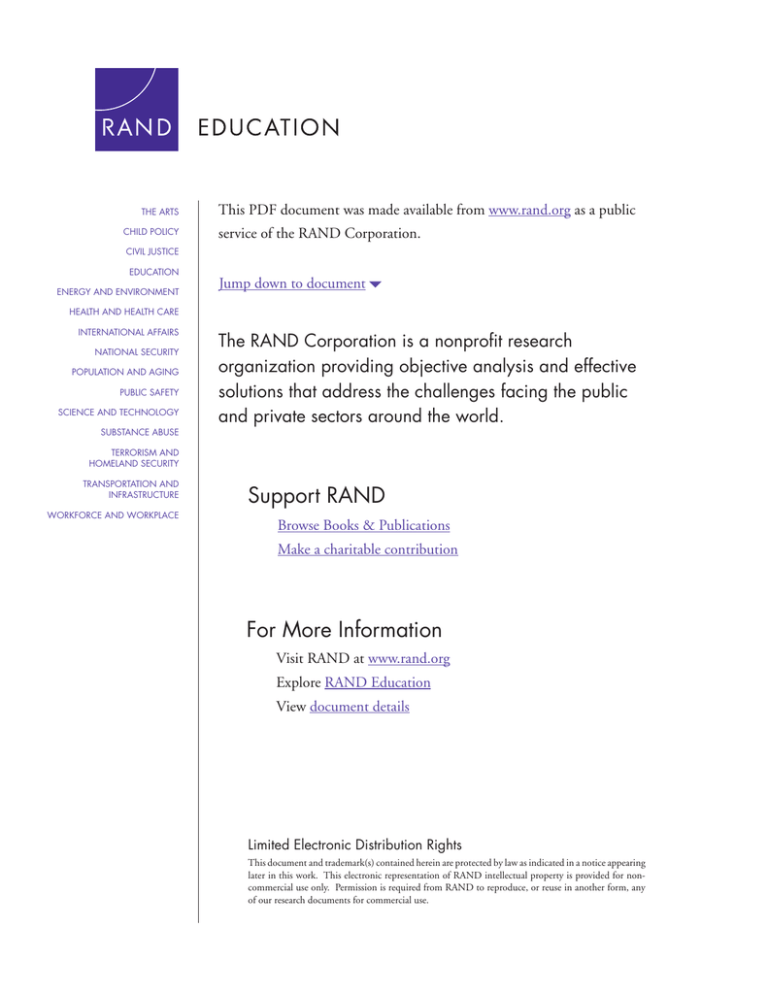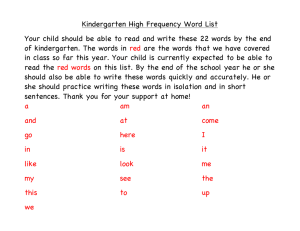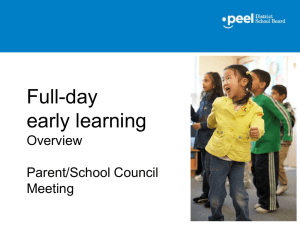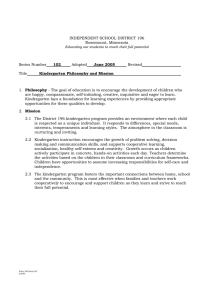
THE ARTS
CHILD POLICY
This PDF document was made available from www.rand.org as a public
service of the RAND Corporation.
CIVIL JUSTICE
EDUCATION
ENERGY AND ENVIRONMENT
Jump down to document6
HEALTH AND HEALTH CARE
INTERNATIONAL AFFAIRS
NATIONAL SECURITY
POPULATION AND AGING
PUBLIC SAFETY
SCIENCE AND TECHNOLOGY
SUBSTANCE ABUSE
The RAND Corporation is a nonprofit research
organization providing objective analysis and effective
solutions that address the challenges facing the public
and private sectors around the world.
TERRORISM AND
HOMELAND SECURITY
TRANSPORTATION AND
INFRASTRUCTURE
WORKFORCE AND WORKPLACE
Support RAND
Browse Books & Publications
Make a charitable contribution
For More Information
Visit RAND at www.rand.org
Explore RAND Education
View document details
Limited Electronic Distribution Rights
This document and trademark(s) contained herein are protected by law as indicated in a notice appearing
later in this work. This electronic representation of RAND intellectual property is provided for noncommercial use only. Permission is required from RAND to reproduce, or reuse in another form, any
of our research documents for commercial use.
This product is part of the RAND Corporation monograph series. RAND monographs present major research findings that address the challenges facing the public
and private sectors. All RAND monographs undergo rigorous peer review to ensure
high standards for research quality and objectivity.
School Readiness,
Full-Day Kindergarten, and
Student Achievement
An Empirical Investigation
Vi-Nhuan Le, Sheila Nataraj Kirby, Heather Barney,
Claude Messan Setodji, Daniel Gershwin
Supported by the Rockefeller Foundation and the Ford Foundation
The research described in this report was conducted within RAND Education and was
supported by the Rockefeller and Ford Foundations.
The RAND Corporation is a nonprofit research organization providing objective analysis
and effective solutions that address the challenges facing the public and private sectors
around the world. RAND’s publications do not necessarily reflect the opinions of its
research clients and sponsors.
R® is a registered trademark.
© Copyright 2006 RAND Corporation
All rights reserved. No part of this book may be reproduced in any form by any electronic or
mechanical means (including photocopying, recording, or information storage and retrieval)
without permission in writing from RAND.
Published 2006 by the RAND Corporation
1776 Main Street, P.O. Box 2138, Santa Monica, CA 90407-2138
1200 South Hayes Street, Arlington, VA 22202-5050
4570 Fifth Avenue, Suite 600, Pittsburgh, PA 15213-2665
RAND URL: http://www.rand.org/
To order RAND documents or to obtain additional information, contact
Distribution Services: Telephone: (310) 451-7002;
Fax: (310) 451-6915; Email: order@rand.org
Summary
Background and Purpose
In recent years, there has been increased attention toward ensuring that children enter school
“ready to learn.” While there is little consensus on the specific skills and knowledge that constitute school readiness, many educators, researchers, and policymakers adopt a broad perspective that extends beyond literacy and cognitive skills and includes social, emotional, and
physical health. Despite the attention and focus on school readiness, recent research shows
that large skill gaps exist even before children enter kindergarten. For example, on average,
minority children come to kindergarten with lower literacy skills and poorer social development than do white students. This is an issue of serious concern for educators and policymakers because the skills and knowledge that children have upon entering school are predictive of
later achievement.
In an attempt to address the differences in the school readiness of certain groups of
children, some policymakers advocate the provision of full-day kindergarten. Proponents of
full-day kindergarten argue that the extended time in these programs can be used to increase
students’ readiness at first grade and beyond. They also point to studies that show academic
benefits of full-day kindergarten participation through the end of first grade. However, critics
point to the costs of implementing full-day kindergartens, and the uncertainty about the longterm benefits of full-day kindergarten.
This study uses data from the Early Childhood Longitudinal Study, Kindergarten Class
of 1998–1999 (ECLS-K) to examine how children’s skills and knowledge at kindergarten
entry predict their achievement in later grades. It extends previous research by examining
longer-term achievement outcomes, namely test scores at the end of fifth grade, and gives
an indication of how other nonacademic areas of school readiness (i.e., physical and socioemotional development) may be related to test performance. This study addresses two research
questions:
• What is the relationship between children’s school readiness skills at kindergarten entry
and reading and mathematics achievement through the fifth grade?
• What kindergarten program factors predict the development of nonacademic school
readiness skills? In particular, is attendance at a full-day program related to nonacademic
school readiness?
xi
xii
School Readiness, Full-Day Kindergarten, and Student Achievement: An Empirical Investigation
Methods
We analyzed data from 7,897 students and their parents, teachers, and school leaders collected
during five waves: fall of kindergarten and spring of kindergarten, first grade, third grade, and
fifth grade. Children completed mathematics and reading assessments at each wave, as well
as fine and gross motor skills’ assessments at kindergarten entry. At each wave, their teachers provided information on teaching practices, experience, and class size. Teachers also provided information about children’s attendance at full-day kindergarten program, and their
nonacademic readiness skills along five dimensions: approaches to learning (i.e., disposition
toward learning), self-control, interpersonal skills, and internalizing behaviors and externalizing behaviors (measured by a scale indicating acting-out behaviors such as getting angry,
arguing, fighting, etc.) as students moved through school. Parents provided information about
the child’s home background, and school leaders provided information about school context
variables, such as percent of minority students.
We conducted a longitudinal, cross-classified analysis in which students’ outcomes over
the five time points were modeled in relation to their school program characteristics, classroom
and school context factors, school readiness skills at kindergarten entry, and other covariates.
The model included both random and fixed effects for school- and student-level variables.
Findings
School Readiness and Reading and Mathematics Achievement
We found that both academic and nonacademic school readiness skills at entry to kindergarten were significantly related to eventual reading and mathematics achievement in fifth
grade. Controlling for nonacademic readiness skills at kindergarten entry eliminated the blackwhite achievement gap in reading at the fifth grade, while attending a full-day kindergarten
was unrelated to reading performance. Attendance in a full-day kindergarten program was
not related to achievement in mathematics in fifth grade except when nonacademic school
readiness factors were included in the model. When those factors were considered, full-day
attendance was negatively related to math achievement. In other words, after controlling for
nonacademic readiness at kindergarten, children who had attended a full-day program at kindergarten showed poorer mathematics performance in fifth grade than did children who had
attended a part-day kindergarten program. This finding raises the possibility that earlier studies may have failed to find relationships between full-day kindergarten and outcomes because
they omitted important information relating to nonacademic dimensions of readiness. Future
studies should explore whether the inclusion of such variables changes interpretations about
the effectiveness of full-day programs.
Kindergarten Program Factors and Nonacademic Readiness Skills
Attendance in a full-day kindergarten program was negatively associated with attitudes toward
learning, self-control, and interpersonal skills, and was positively related toward internalizing
(measured by a scale indicating presence of anxiety, loneliness, low self-esteem, and sadness)
Summary
xiii
and externalizing behaviors. With the exception of class size (the effect of which was counterintuitive), few kindergarten program features were related to nonacademic readiness skills.
Instead, positive home background factors, such as higher income and higher parental involvement with the school, were associated with all five dimensions of nonacademic school readiness skills; higher income and more parental involvement were positively related to a child’s
attitudes toward learning, self-control, and interpersonal skills and negatively predictive of
internalizing and externalizing actions.
Study Limitations
This study did not control for a number of variables. For example, this study did not attempt
to address potential self-selection bias, where parents with certain characteristics are more
likely to choose full-day kindergarten programs. The theoretical direction of the bias could
reflect either positive or negative selection, although there is some evidence that suggests that
lower-income parents are more likely to enroll their children in full-day programs. Regardless
of the direction of the bias, future studies should consider statistical methods that control for
self-selection.
A second limitation of our study concerns potential aggregation bias stemming from the
school-level measures of kindergarten program characteristics. Due to computational limitations, we could not estimate a three-level model (i.e., students nested within teachers nested
within schools), and instead we conducted a two-level model (i.e., children nested in schools).
Additional research on whether teacher-level measures of kindergarten program characteristics
would offer different interpretations is warranted.
Implications
Our analyses reinforce the findings of earlier studies that suggest that full-day kindergarten
programs may not enhance achievement in the long term. Furthermore, our study raises the
possibility that full-day kindergarten programs may actually be detrimental to mathematics performance and nonacademic readiness skills. However, these findings should be interpreted carefully because we have not accounted for potential self-selection bias or other
nonobservable factors. It is possible that some of our findings are driven by unobserved
characteristics.
Our results also suggest that investments in the development of nonacademic school
readiness skills may not only raise overall achievement but may also narrow the achievement
gap between minority and white students. Indeed, on average, white students enter kindergarten with better nonacademic skills than do blacks and Hispanics. Our findings indicate that
racial/ethnic differences in achievement might be narrowed if we could enhance the nonacademic readiness skills of minority students, particularly black students, at an early age. Current
full-day kindergarten programs do not affect nonacademic skills, but perhaps redesigned early
education programs could improve nonacademic skills that ultimately translate into improved
academic achievement.
Ultimately, the decision regarding where policymakers should direct funds needs to be
guided by a cost-benefit analysis that compares investments in full-day kindergarten programs
to investments in other potential interventions, such as those that promote nonacademic readi-
xiv
School Readiness, Full-Day Kindergarten, and Student Achievement: An Empirical Investigation
ness skills. While full-day kindergarten programs have been shown to have some initial positive effects on student achievement, it unknown whether the apparent lack of enduring benefits
merits the costs associated with their implementation. A program of research that involves a
better understanding of how full-day programs and nonacademic skills may influence outcomes and the associated costs of each type of intervention would provide a strong foundation
for future decisions about effective programs.







